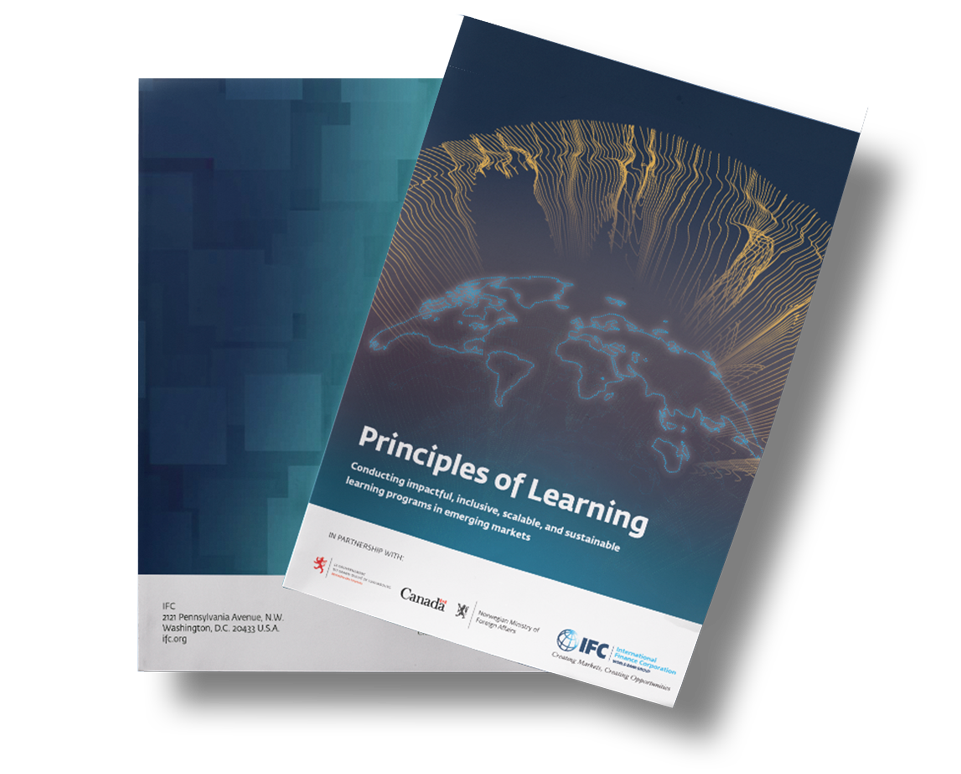IMPACTFUL
PRINCIPLE 1
Align learning objectives and evaluation methods with the client’s performance needs and business objectives.
A training or skills development practitioner should always collaborate closely with the client, for example, the entrepreneur, company, or organization, to gain a clear understanding of their desired performance outcomes, targets, and business objectives. All content and activities in the program should align with these outcomes. Evaluation methods should be developed to measure success. Agreements should be established with clients to ensure learning goals match the business objectives.
PRINCIPLE 2
Develop engaging learning programs that address the skills and knowledge gaps of participants and increase their resilience.
When developing a learning program, practitioners should consult with the client and relevant stakeholders including participants to gain a clear understanding of the baseline needs, knowledge and skills of participants. Skill-building programs should also validate and measure the new skills and knowledge acquired by participants. Finally, learning experiences should be interactive and managed in a way that enables both facilitators and participants to succeed.
INCLUSIVE
PRINCIPLE 3
Address performance gaps and challenges specific to emerging markets and fragile and conflict-affected situations.
Performance and learning practitioners face additional challenges when working in emerging markets and fragile and conflict-affected situations. These can be at the macro level and related, for example, to the economic or legal environment, safety and security, local cultural, religious and political sensitivities, or reliability of infrastructure and technology. These challenges can also be at the individual level and reflect a participant’s confidence and resilience levels, budget constraints, and access to networks. In either case, learning programs should adapt to the unique needs of the program location and participants.
PRINCIPLE 4
Develop gender-inclusive learning solutions that promote equal access to skill-building programs and reduce barriers to participation.
Women in emerging markets often face significant barriers in doing business, accessing finance, or career advancement. Gender-inclusive programs take into account specific issues that may disproportionately limit the participation of women. For example, they factor in mobility and safety constraints by providing secure transportation, accommodate family responsibilities by scheduling training around school hours, address different education levels by tailoring course content, and help women believe in their own abilities by offering activities that build their self-confidence. These programs also focus on skills development by offering access to mentoring, coaching, and peer networks.
SCALABLE
PRINCIPLE 5
Leverage digital solutions and re-usable components to design interactive learning programs that are cost-effective and scalable.
Learning programs should be participant-focused, with learning methods and digital solutions that increase engagement and interactivity. Programs should be designed with components that can, whenever possible, be easily replicated and modified to ensure they are cost-effective and scalable.
PRINCIPLE 6
Apply a systematic, competency-based approach in the development and delivery of learning programs to ensure quality and consistency.
Following a systematic process helps to improve value, impact, and quality of performance improvement initiatives, demonstrates accountability, and allows for cross-project and cross-organizational comparisons. IFC’s Guide to Training provides trainers, advisory service providers, instructors, and other skills development professionals with a rigorous set of competencies tailored specifically to the needs of emerging markets.
SUSTAINABLE
PRINCIPLE 7
Use and assist in developing qualified local advisory service providers to design and deliver learning programs.
The use of qualified, certified local advisory service providers offers benefits at multiple levels. Local providers often have nuanced insight into the considerations and challenges involved in developing or implementing skills-building programs in emerging markets. At the same time, using local providers can help strengthen that region’s advisory services market and deepen its network of resources to drive broader private sector capacity building.
PRINCIPLE 8
Effectively transition learning programs to the client to promote sustainability and long term business resilience.
Effective skill-building programs support participants as they apply newly-acquired skills and knowledge in their real-life environments during and after the program. Programs should include transition plans that leverage the client’s internal resources to sustain participant performance over the long term.





